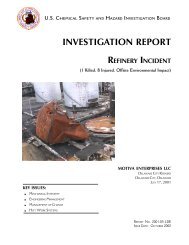Little General Store Propane Explosion - US Chemical Safety and ...
Little General Store Propane Explosion - US Chemical Safety and ...
Little General Store Propane Explosion - US Chemical Safety and ...
Create successful ePaper yourself
Turn your PDF publications into a flip-book with our unique Google optimized e-Paper software.
<strong>Little</strong> <strong>General</strong> <strong>Store</strong> September 2008<br />
valve. No one was injured. Students remained at a church across the street until parents arrived to take<br />
them home.<br />
1.3.2 Incident Responders<br />
The hazardous materials team involved in this incident has responded to several propane incidents in the<br />
last year, all of which have been vapor releases. They receive technical information from propane service<br />
technicians, but take release mitigation actions themselves. To protect propane service technicians from<br />
entering the release area, the team uses methods including<br />
• taking digital photographs of tank damage so that technicians can see <strong>and</strong> assess the damage on a<br />
remote laptop computer,<br />
• bringing similar tanks or other equipment to the scene so that technicians can point out features<br />
the team will find on the incident tank, <strong>and</strong><br />
• escorting technicians to the edge of the secured release area to point out potential leak sources for<br />
team members.<br />
Additionally, the hazardous materials response team trains local 911 operators to use follow-up questions<br />
to elicit needed information from callers reporting hazardous materials incidents. In this incident, as in<br />
Ghent, the 911 operator conveyed little information to the fire department. However, unlike Ghent<br />
responders, the first fire engine company to arrive immediately recognized the danger posed by the<br />
release’s proximity to a building <strong>and</strong> called for hazardous materials backup.<br />
The propane service technicians responding to this incident were branch employees of a national propane<br />
company that uses CETP. In the event of a propane emergency, whichever technicians are working<br />
nearest the incident stop work immediately <strong>and</strong> respond. Since these responders are all trained with<br />
CETP, they are familiar with what types of incidents they can mitigate using normal propane procedures.<br />
71









